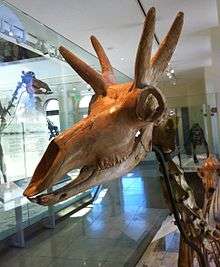Stockoceros
| Stockoceros Temporal range: Pleistocene–0.012 | |
|---|---|
 | |
| S. onusrosagris skeleton | |
| Scientific classification | |
| Kingdom: | Animalia |
| Subkingdom: | Eumetazoa |
| Phylum: | Chordata |
| Class: | Mammalia |
| Order: | Artiodactyla |
| Family: | Antilocapridae |
| Genus: | †Stockoceros Skinner, 1942 |
| Species | |
| |
Stockoceros is an extinct genus of the North American artiodactyl family Antilocapridae,[2] known from Mexico and the southwestern United States.[1] Its horns are each divided near their base into two prongs of roughly equal length.
The genus survived until about 12,000 years ago, and was present when Paleo-Indians reached North America.[3][4]
One of the co-discoverers of S. onusrosagris was Quentin Roosevelt II, grandson of Theodore Roosevelt; he was 14 at the time of the discovery.[5][6]

S. conklingi skull
References
- 1 2 "Stockoceros Skinner 1942". Paleobiology Database. Retrieved 2014-09-09.
- ↑ Rivals, F.; Semprebon, G. M. (2006). "A comparison of the dietary habits of a large sample of the Pleistocene pronghorn Stockoceros onusrosagris from the Papago Springs Cave in Arizona to the modern Antilocapra americana". Journal of Vertebrate Paleontology 26 (2): 495. doi:10.1671/0272-4634(2006)26[495:ACOTDH]2.0.CO;2.
- ↑ "Stockoceros conklingi Stock 1930". Paleobiology Database. Retrieved 2015-11-21.
- ↑ "Stockoceros onusrosagris Roosevelt and Burden 1934". Paleobiology Database. Retrieved 2015-11-23.
- ↑ Roosevelt, Q.; Burden, J. W. (1934). "A new species of antilocaprine, Tetrameryx onusrosagris, from a Pleistocene cave deposit in southern Arizona". American Museum Novitates (AMNH) 754: 1–4. Retrieved 2015-11-21.
- ↑ "Burden's Pronghorn: an Arizona Story". Prehistoric Pronghorn. International Wildlife Museum. Retrieved 2015-11-21.
This article is issued from Wikipedia - version of the Monday, November 23, 2015. The text is available under the Creative Commons Attribution/Share Alike but additional terms may apply for the media files.